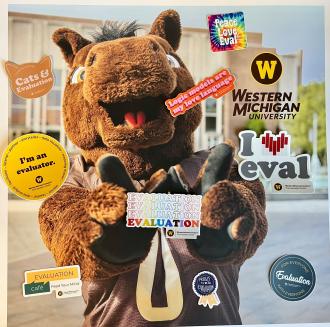The Exhibit Hall
Visit Booth #207, hosted by The Evaluation Center!
Swing by our booth to learn more about The Evaluation Center and our initiatives, including:
- EvaluATE, delivering open-access webinars and resources for evaluation practitioners and consumers.
- The Evaluation Checklist Project, providing more than 30 checklists on diverse topics to guide evaluation and practice.
- The Journal of MultiDisciplinary Evaluation (JMDE), publishing insights and research on evaluation through an open-access, peer-reviewed journal
- Valeo, offering a suite of self-paced courses on program evaluation, combining evaluation theory, proven practices, and insights from experienced evaluators.
- Evaluation Café, a speaker series creating space for engagement, dialogue, and knowledge sharing in the evaluation community.
Don't forget to pick up our unique evaluation-themed vinyl stickers, Sharpies, and temporary tattoos to complete your conference experience!
WMU Posters
Wednesday, November 12
5:30 - 7 p.m. CST
107 - Adapting to Change: Demonstrating Practical Evaluation Responses to the 2025 Executive Order on Merit-Based Practices
Presenters: Ana L. Vasquez-Quino, Gary Miron, Mahamat Abdoulaye Kerim, Rohullah Wahidi
122 - Beyond Roots: A History of Michael Scriven's Academic Publications
Presenters: Michael J. Hart
175 - Evaluation as a Career Catalyst: Preparing Undergraduates for the Workforce
Presenters: Lori A. Wingate, Brandon W. Youker
240 - Research on Sustainability Evaluation: A Hands-On Demo of Systematic Reviews and the Ethical Use of AI
Presenters, Daniela Schroeter, Andrea Vernola, Lucy Veriegh, Zion Bahre



